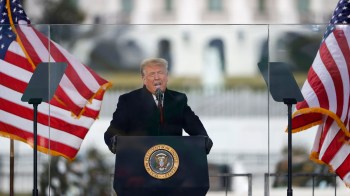Measuring the success of the stimulus
TEXT OF STORY
KAI RYSSDAL: Officially it’s still under negotiation in a House-Senate conference committee, but it’s fair to say the stimulus package the president will sign sometime soon is going to look a lot like the agreement announced yesterday. A $789 billion bag of mixed economic polices. The president had nice things to say about the Congressional version of the plan — that it’s still going create or save 3.5 million jobs. Even if it does, is that going to be enough to drive up consumption and actually stimulate the economy? And if it does, how would you measure that, anyway?
From Washington, Marketplace’s Nancy Marshall Genzer has more.
NANCY MARSHALL GENZER: Everybody gave up something in the congressional negotiations over the stimulus bill. There’ll be less money for school construction and tax cuts. Workers will now only see about 13 extra bucks a week from the payroll tax cut. That may only increase consumption at the dollar store.
ALAN BLINDER: I would like it to have been bigger.
Alan Blinder teaches economics at Princeton.
BLINDER: Unfortunately a lot of what happened in the compromising and scaling back of the program took some of the stimulative bite out of it.
Still, Blinder says, it’s better than nothing. Low-income consumers tend to spend every extra dollar they get, so they could help stimulate the economy. Tax cuts for businesses are designed to get them to boost production. But companies will only hire and buy new equipment if they think the economy is improving. Tyler Cowen teaches economics at George Mason University. He says stimulus money for local governments will at least stabilize consumption.
TYLER COWEN: Because they will otherwise be cutting their spending now, and that can to some extent be prevented. More of the bill should do that.
As it is, Cowen thinks it’ll take a year for the stimulus spending to have any effect on consumption. Nigel Gault says we could see some small growth at the end of this year. Gault is chief U.S. economist at IHS Global Insight. He’s tried to measure the impact of the stimulus.
NIGEL GAULT: You know it may reduce the peak unemployment rate perhaps by about a percentage point.
But Gault says there’s a wide margin for error. The White House uses complex formulas to figure out the impact of each stimulus dollar. But Gault says models don’t always work. They assume people and businesses will act a certain way. But that’s not always the case, especially during a recession, when caution is the rule.
In Washington, I’m Nancy Marshall Genzer for Marketplace.
There’s a lot happening in the world. Through it all, Marketplace is here for you.
You rely on Marketplace to break down the world’s events and tell you how it affects you in a fact-based, approachable way. We rely on your financial support to keep making that possible.
Your donation today powers the independent journalism that you rely on. For just $5/month, you can help sustain Marketplace so we can keep reporting on the things that matter to you.


















